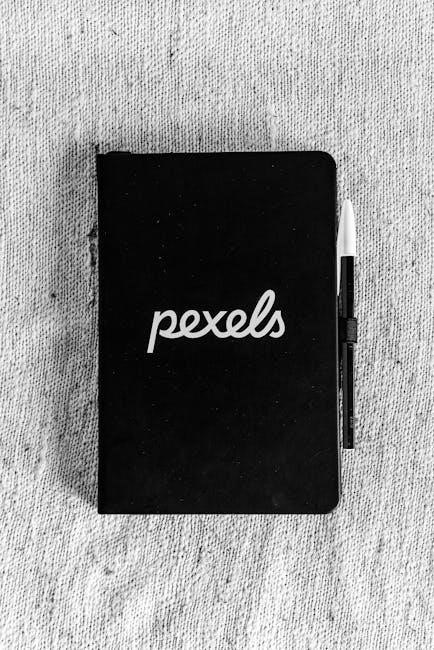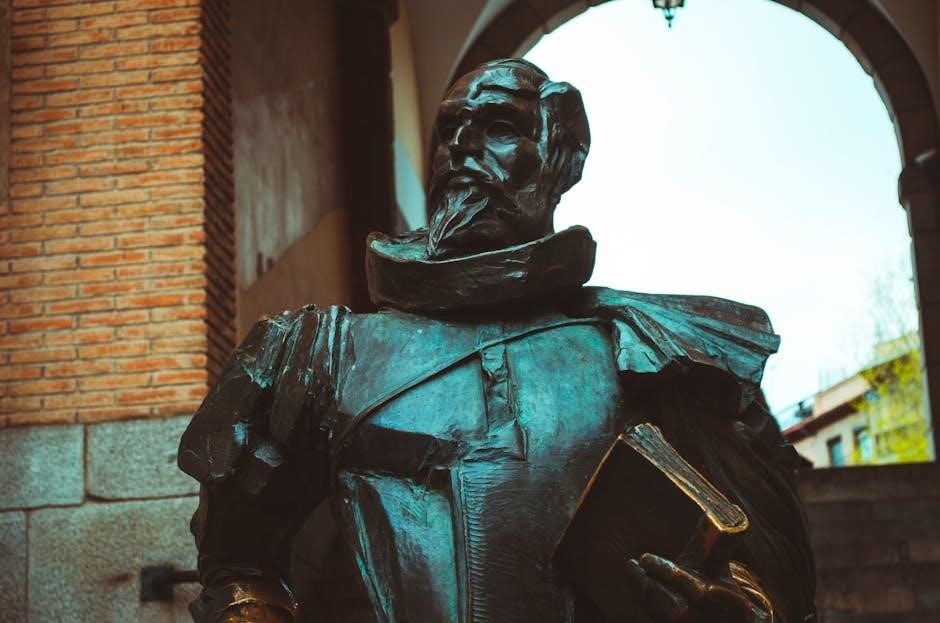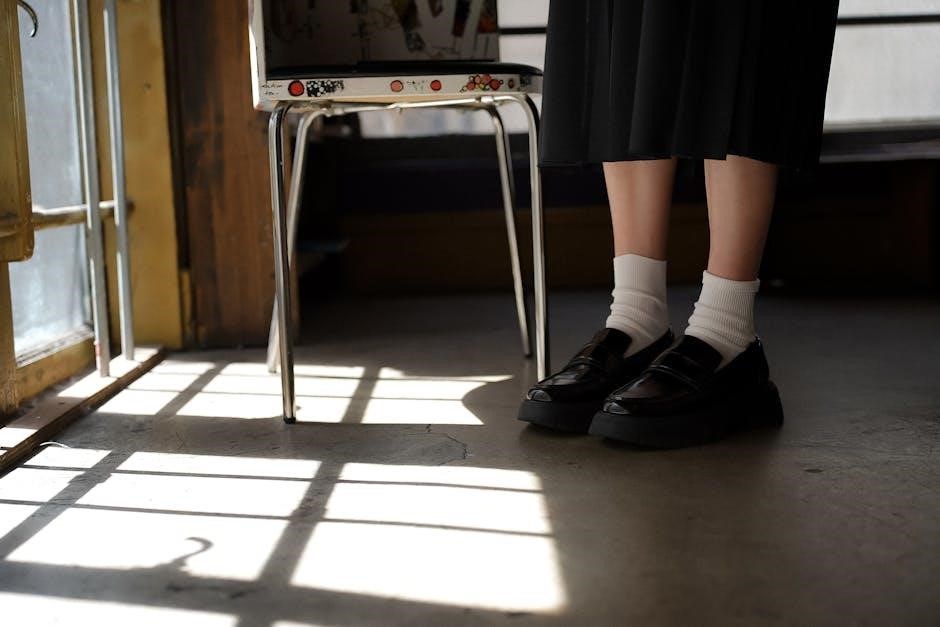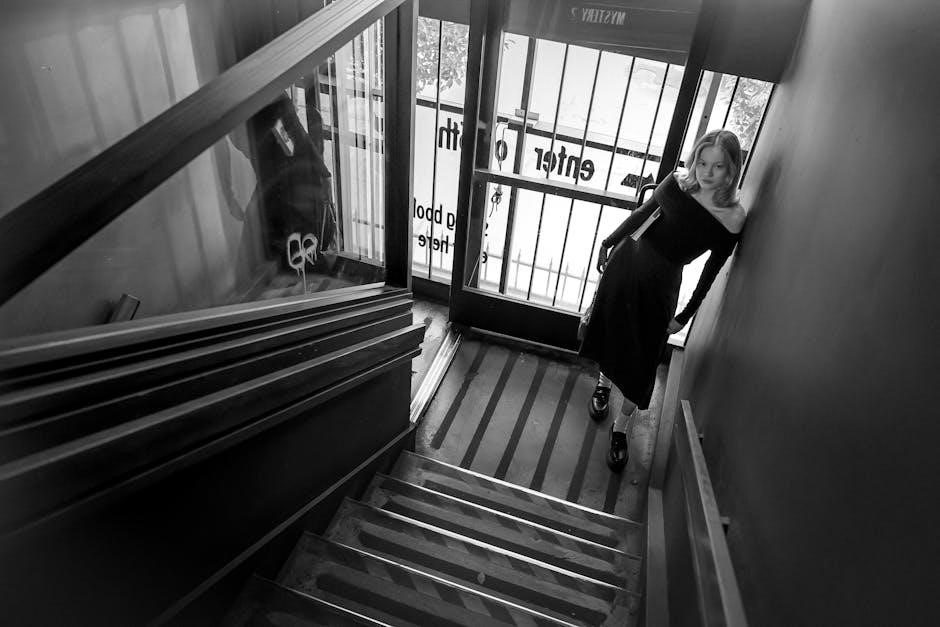La Guerra Sucia‚ or Argentina’s Dirty War‚ refers to a period of state-sponsored terrorism from 1976 to 1983‚ marked by forced disappearances and repression.
The book provides a vital historical account of this era‚ highlighting the military junta’s brutal regime and its impact on Argentine society and culture.
It serves as a poignant reminder of the atrocities committed‚ offering insights into the mechanisms of state terror and its lasting effects on national identity.
Overview of the Book
“La Guerra Sucia” delves into Argentina’s Dirty War (1976-1983)‚ a period of state terrorism marked by disappearances‚ torture‚ and repression. The book explores the military junta’s rise to power and its systematic targeting of civilians‚ including political opponents‚ activists‚ and ordinary citizens. It examines the scale of human rights abuses‚ with approximately 30‚000 people forcibly disappeared. The text also highlights the role of secret detention centers and the psychological impact on survivors and families. By preserving historical records and testimonies‚ the book serves as a critical resource for understanding this dark chapter. Its availability as a PDF ensures accessibility for academic and personal study‚ fostering awareness and reflection on the atrocities committed during this era.
Historical Context of Argentina’s Dirty War
The Dirty War in Argentina occurred during the military dictatorship from 1976 to 1983‚ a period marked by state-sponsored terrorism and repression. The junta‚ led by General Jorge Videla‚ sought to eliminate political opposition‚ targeting left-wing activists‚ intellectuals‚ and anyone deemed a threat to their regime. This era was characterized by widespread human rights abuses‚ including forced disappearances‚ torture‚ and extrajudicial killings. The regime’s “National Reorganization Process” aimed to reshape society by suppressing dissent and political activity. The Dirty War deeply scarred Argentine society‚ leaving a legacy of trauma and a collective demand for justice and accountability. The book “La Guerra Sucia” provides a detailed account of this tumultuous period‚ offering insights into its historical roots and societal impact.
Significance of the Book in Understanding State Terrorism
“La Guerra Sucia” is a pivotal work that sheds light on the mechanisms of state terrorism during Argentina’s Dirty War. The book provides a comprehensive account of the systematic repression‚ forced disappearances‚ and torture carried out by the military junta. By documenting these atrocities‚ it offers a critical understanding of how authoritarian regimes use terror to control populations. The book also highlights the importance of preserving historical records and archives‚ which serve as tools for transitional justice and accountability. Its analysis of state-sponsored violence and its societal impact makes it an essential resource for scholars‚ activists‚ and anyone seeking to comprehend the complexities of state terrorism and its lasting effects on national memory and human rights advocacy.

Historical Background of the Dirty War
The Dirty War began with a 1976 military coup‚ leading to a 1976–1983 junta rule marked by repression‚ disappearances‚ and torture‚ deeply impacting Argentine society.
The Military Junta and Its Rise to Power

The Argentine military junta seized power in 1976‚ overthrowing President Isabel Perón amid economic turmoil and political instability. Led by General Jorge Videla‚ the junta sought to eliminate perceived threats to national security‚ labeling dissenters as subversives. The regime implemented a harsh campaign of state terrorism‚ targeting leftists‚ intellectuals‚ and anyone opposed to its rule. This marked the beginning of “La Guerra Sucia‚” or the Dirty War. The junta’s rise was facilitated by internal political fragmentation and societal fear of communism‚ allowing the military to consolidate control and impose authoritarian rule. This period laid the groundwork for widespread repression and human rights abuses documented in La Guerra Sucia.
Key Events and Timeline (1976-1983)
The Argentine Dirty War began in 1976 with a military coup‚ marking the start of a brutal dictatorship. By 1977‚ state terrorism intensified‚ with thousands disappearing. In 1981‚ General Leopoldo Galtieri took power‚ escalating repression. The 1982 Falklands War debacle weakened the junta‚ leading to its collapse. Elections in 1983 ended military rule. These events highlight the regime’s rise‚ atrocities‚ and eventual downfall‚ as documented in La Guerra Sucia.
- 1976: Military coup ousts Isabel Perón‚ starting the Dirty War.
- 1977: Mothers of the Plaza de Mayo form to seek missing children.
- 1981: Galtieri becomes junta leader‚ increasing repression.
- 1982: Falklands War leads to military defeat and junta’s decline.
- 1983: Democratic elections end military rule.

Impact on Argentine Society
The Dirty War profoundly affected Argentine society‚ leaving deep scars. It instilled widespread fear and mistrust‚ destroying social fabric and fostering a culture of silence. Families were torn apart by disappearances‚ creating intergenerational trauma. Economically‚ the junta’s policies led to crisis‚ exacerbating inequality and poverty. Culturally‚ the regime suppressed dissent‚ censorship became pervasive‚ and artistic expression was stifled. However‚ this repression also sparked resistance‚ with underground movements and human rights groups like the Mothers of the Plaza de Mayo emerging. The legacy of this period continues to shape Argentina’s identity‚ influencing art‚ literature‚ and collective memory. Society remains divided‚ grappling with justice and reconciliation.
Repression and Disappearances

The Dirty War unleashed systematic repression‚ with forced disappearances as a hallmark of state terror. Thousands vanished‚ leaving families in anguish and society traumatized by fear and silence.
Forced Disappearances and Their Scale
Forced disappearances were a central tactic of the Dirty War‚ with estimates suggesting between 30‚000 to 90‚000 people vanished. The military junta targeted suspected dissidents‚ activists‚ and civilians‚ often seizing them in night raids or public abductions. Families were left without answers‚ their loved ones erased from official records. This systematic campaign of disappearance aimed to instill fear and eliminate opposition‚ creating a climate of terror. The scale of vanishings remains a haunting reminder of state-sponsored repression‚ with many cases still unaccounted for‚ leaving deep scars on Argentine society and its collective memory.
Secret Detention Centers and Torture Methods
The Dirty War featured a network of secret detention centers‚ such as ESMA and the Navy School of Mechanics‚ where regime opponents were held and tortured. These centers were instrumental in the junta’s campaign of terror‚ with prisoners subjected to electric shocks‚ beatings‚ and psychological torment. Many were held in inhumane conditions‚ often blindfolded and chained. Torture methods were designed to extract information and crush dissent‚ leaving survivors with deep physical and emotional scars. These practices‚ documented in “La Guerra Sucia‚” reveal the brutal mechanisms of state repression and the systematic violation of human rights during Argentina’s darkest era.

The Role of the Military in Targeting Civilians
The Argentine military played a central role in targeting civilians during the Dirty War‚ often labeling them as “subversives” or “threats” to justify their actions. Civilians‚ including students‚ activists‚ and intellectuals‚ were subjected to arbitrary arrests‚ raids‚ and disappearances. The military’s strategy was to create a climate of fear‚ targeting not only suspected guerrillas but also anyone perceived as opposing the regime. This broad targeting of civilians was a deliberate attempt to dismantle social and political networks‚ silencing dissent and consolidating power. The military’s actions were marked by a systematic disregard for human rights‚ leaving deep scars on Argentine society and its collective memory.
Role of Archives and Documentation
Archives and documentation in “La Guerra Sucia” provide critical evidence of atrocities‚ preserving memories and aiding in justice and accountability for the victims of state terrorism.
Preservation of Records and Their Importance
Preserving records from Argentina’s Dirty War is vital for historical accuracy and justice. The book “La Guerra Sucia” highlights how testimonies‚ documents‚ and archives expose state-sponsored violence. These records serve as irrefutable evidence of atrocities‚ ensuring accountability and combating impunity. Archives also act as a collective memory‚ honoring victims and survivors. By safeguarding these materials‚ future generations can understand the horrors of state terrorism. The preservation of records is not just about the past but also about fostering truth and accountability in the present. It ensures that the voices of the disappeared and their families are never silenced‚ keeping their stories alive for justice and remembrance.
Archives as Tools for Transitional Justice
Archives play a pivotal role in transitional justice by providing evidence of human rights violations during Argentina’s Dirty War. The book “La Guerra Sucia” emphasizes how these records facilitate truth-telling and accountability. They contain testimonies‚ military documents‚ and legal files crucial for investigations and prosecutions. Archives also aid in identifying victims and locating remains‚ offering closure to families. By preserving these materials‚ societies can confront past atrocities and implement reforms to prevent future abuses. Archives empower truth commissions and support reparations for victims‚ fostering healing and justice. Their role in transitional justice underscores the importance of transparency and accountability in rebuilding trust in institutions.
Literary and Academic Perspectives
“La Guerra Sucia” offers profound literary insights into Argentina’s tumultuous past‚ blending historical narrative with emotional depth. Academically‚ it is praised for its meticulous research and critical analysis‚ serving as a primary source in scholarly discussions on state terrorism and human rights. The book’s thematic exploration of power‚ resistance‚ and memory resonates across disciplines‚ making it a vital text in Latin American studies and beyond. Its accessibility ensures it is widely used in educational settings‚ fostering dialogue on justice and accountability.
“La Guerra Sucia” as a Literary Work
“La Guerra Sucia” stands out as a compelling literary work that masterfully combines historical narrative with deeply personal accounts. The author’s use of vivid storytelling and meticulous archival research creates a gripping portrayal of Argentina’s Dirty War. By weaving together testimonies of survivors‚ victims’ families‚ and even former regime officials‚ the book humanizes the atrocities‚ making the abstract concept of state terrorism relatable. Its chronological structure‚ paired with reflective commentary‚ provides readers with a nuanced understanding of the era. The inclusion of primary sources‚ such as documents and photographs‚ enhances its literary depth and historical authenticity. Through its accessible prose‚ the book bridges the gap between academic history and personal memoir‚ ensuring its enduring relevance as both a historical record and a poignant literary achievement.
Analysis of Key Chapters and Themes
The book delves into pivotal chapters that dissect the Dirty War’s complexities. Themes of state-sponsored terror‚ resistance‚ and memory are central‚ offering a layered exploration of Argentina’s tumultuous past. Key chapters examine the military’s ideological motivations‚ societal repression‚ and the resilience of opposition movements. The narrative seamlessly intertwines personal testimonies with broader historical analysis‚ creating a balanced perspective. Themes of impunity and justice are also explored‚ highlighting the long-term consequences of unchecked power. The author’s meticulous attention to detail ensures a comprehensive understanding of the era‚ making the book a vital resource for grasping the multifaceted impact of the Dirty War on Argentine society and its collective memory.
Scholarly Reviews and Citations
Scholars have widely praised La Guerra Sucia for its meticulous documentation and insightful analysis of Argentina’s Dirty War. The book is frequently cited in academic studies on state terrorism‚ human rights‚ and transitional justice. Researchers highlight its ability to connect historical events with contemporary societal impacts. Many reviewers commend the author’s balanced approach‚ blending personal narratives with broader political contexts. The work is often recommended as a key resource for understanding the complexities of authoritarian regimes. Its vivid portrayal of repression and resistance has made it a cornerstone in Latin American studies‚ ensuring its relevance for both historians and general readers seeking to comprehend this dark chapter of Argentine history;

International Responses and Reactions
The international community condemned Argentina’s Dirty War‚ with human rights organizations like Amnesty International raising global awareness. Diplomatic pressure and sanctions followed‚ isolating the regime.
Global Awareness and Human Rights Campaigns
The “Dirty War” in Argentina sparked global outrage‚ with human rights campaigns amplifying the plight of victims. International organizations and activists played a crucial role in exposing atrocities‚ leveraging media and diplomacy. The disappearance of civilians‚ including foreigners‚ drew attention from governments and NGOs worldwide. Campaigns highlighted systematic state terrorism‚ urging accountability. Grassroots movements‚ such as the Mothers of the Plaza de Mayo‚ became symbols of resistance‚ gaining international sympathy. Their efforts pressured governments to impose sanctions and condemn Argentina’s regime. The book La Guerra Sucia further illuminated these crimes‚ serving as a catalyst for global awareness and advocacy. It remains a vital resource in understanding the era’s horrors and the fight for justice.
Role of International Organizations
International organizations played a pivotal role in addressing the atrocities of Argentina’s Dirty War. Bodies like Amnesty International and Human Rights Watch documented human rights abuses‚ raising global consciousness. The United Nations condemned the regime’s actions‚ while organizations like the Inter-American Commission on Human Rights investigated disappearances. These entities provided platforms for victims’ families to voice their struggles‚ mobilizing international pressure. The book La Guerra Sucia became a critical resource‚ offering detailed accounts that supported these organizations’ efforts. Their collective activism led to heightened scrutiny of Argentina’s military regime‚ ultimately contributing to its downfall and the pursuit of justice for victims and their families.

Impact on Argentine Culture and Society
The Dirty War deeply impacted Argentine culture‚ fostering collective trauma and reshaping national identity. It inspired countless artistic expressions and social movements seeking justice and truth;
Collective Memory and National Identity
The Dirty War profoundly shaped Argentina’s collective memory‚ creating a shared trauma that resonates deeply in the national psyche. The systematic disappearances and state terrorism fostered a society grappling with its past‚ leading to a redefined sense of identity. “La Guerra Sucia” serves as a crucial document‚ preserving the memories of victims and their families‚ while also challenging official narratives. Public memorials‚ such as the Parque de la Memoria in Buenos Aires‚ honor the disappeared‚ ensuring their stories remain central to Argentina’s historical consciousness. This collective remembrance has influenced art‚ literature‚ and political discourse‚ fostering a national identity rooted in resistance and the pursuit of justice and truth.

Artistic and Cultural Responses to the Dirty War
The Dirty War inspired a wave of artistic and cultural expressions that aimed to process the trauma and condemned the atrocities. Films like La Historia Oficial and Nueve Reinas addressed the regime’s brutality and its societal impact. Literature‚ such as works by Alicia Partnoy and Jacobo Timerman‚ provided firsthand accounts of survival and resistance. Music became a powerful tool for protest‚ with songs by Víctor Jara and León Gieco resonating with the struggle for justice. Public art and memorials‚ like the iconic Escuela de Mecánica de la Armada mural‚ serve as poignant reminders of the disappeared. These creative responses have played a vital role in preserving memory and fostering dialogue about Argentina’s painful past.

Legacy and Aftermath
The Dirty War’s aftermath saw trials for perpetrators‚ societal healing efforts‚ and a renewed commitment to democracy in Argentina‚ as documented in La Guerra Sucia.
Trials and Prosecution of War Criminals
The trials of Dirty War criminals marked a significant step toward justice‚ with former military leaders facing prosecution for human rights abuses. The 1985 Trial of the Juntas was pivotal‚ convicting top officials for crimes like torture and disappearances. However‚ the 1990s saw controversial pardons‚ undermining accountability efforts. In recent years‚ prosecutions resumed under international law‚ with hundreds of perpetrators facing justice. La Guerra Sucia highlights the legal battles and societal impact of these trials‚ emphasizing the fight against impunity. These proceedings remain crucial for Argentina’s reconciliation‚ revealing the complexities of balancing justice and national healing.
Modern-Day Relevance and Remembrance
The legacy of Argentina’s Dirty War continues to resonate today‚ with remembrance playing a vital role in national healing. Memorials like the ESMA Museum and Plaza de Mayo serve as poignant reminders of the atrocities. La Guerra Sucia remains a critical resource for understanding this period‚ ensuring future generations grasp the horrors of state terrorism. Annual tributes honor the disappeared‚ while survivors’ testimonies keep their stories alive. The book underscores the importance of memory in combating impunity and fostering justice. Modern-day Argentina grapples with reconciliation‚ but remembrance ensures the victims are not forgotten‚ keeping their legacy alive in the pursuit of human rights and accountability.
The book conclusively captures Argentina’s Dirty War‚ serving as a poignant reminder of state terrorism’s horrors and the enduring quest for truth and justice.
Final Thoughts on the Book’s Importance
“La Guerra Sucia” stands as a critical exploration of Argentina’s tumultuous past‚ offering profound insights into state-sponsored violence and its societal impact. By meticulously documenting the Dirty War’s atrocities‚ the book serves as a vital historical record‚ ensuring that the voices of victims and survivors are not forgotten. Its unflinching narrative sheds light on the complexities of authoritarianism and the resilience of human rights movements. The book’s significance lies in its ability to educate future generations about the dangers of unchecked power and the importance of accountability. It remains a essential resource for understanding Argentina’s journey toward justice and reconciliation‚ urging readers to reflect on the universal lessons of this dark chapter in history.
Call to Action for Further Reading and Research
For a deeper understanding of Argentina’s Dirty War‚ readers are encouraged to explore additional resources. “La Guerra Sucia” serves as a foundational text‚ but complementing it with scholarly articles‚ documentaries‚ and testimonial accounts enriches the perspective. Seek out works by Argentine historians and survivors to gain a multifaceted view of this period. Engaging with primary sources‚ such as archival documents and trial records‚ provides firsthand insights into the regime’s mechanisms. Advocating for further research fosters a broader awareness of state terrorism’s global implications. By exploring these materials‚ readers can contribute to ongoing discussions about justice‚ memory‚ and human rights‚ ensuring the lessons of the Dirty War are not forgotten.
